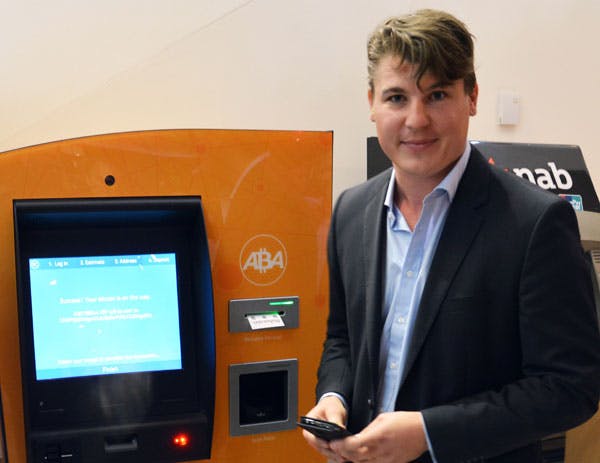It was the thrill of creating something new that led Chris Guzowski to go into business for himself.
The 29-year-old entrepreneur has recently returned to Australia from Europe where he developed a number of businesses in a range of fields, including the renewable energy and venture capital spaces.
His most recent venture sees him tapping into what he believes to be a revolutionary new market. His new company allows Australian shoppers to buy and sell in emerging crypto-currency Bitcoin for the first time.
“It is that creation of value which is really, really exciting,” he tells Dynamic Business. “The fact you’ve contributed obviously by employment but also to your customers…. It’s also nice to be able to make people aware of technology and of new products that they haven’t been aware of before.”
Guzowski’s new company, ABA Technology, plans to roll out 100 Bitcoin ATMs across Australia by 2015 and 500 across the globe by 2016. It’s an ambitious goal, but the young chief executive is chancing his arm that Bitcoin will endure as a digital currency.
“Now I identify Bitcoin as even more significant than Facebook or eBay,” he says. “Bitcoin is a technology as significant as a personal computer in the 1970s or the internet of the 1990s. And there are applications of it that we have not grasped or invented yet.”
ABA Technology is the result of a merger between Krypto Currency Solutions and Australian Bitcoin ATMs in March 2014. Guzowski believes the provision of ATMs will become a crucial part of the Bitcoin ecosystem, and says he saw more value working in partnership rather than in competition.
Guzowski had wanted to capitalise on the Bitcoin phenomenon since 2012, but was waiting for the right time to make his move. The endeavour now takes up 100 per cent of his time, but the young entrepreneur adds that his previous experience holds him in good stead for the journey before him.
After working as an auditor of financial services companies at PricewaterhouseCoopers while finishing his business degree at UTS in Sydney, Guzowski says he gained the skills and the hunger to beat his own path in the business world.
“I realised that the corporate world is quite stale and slow moving and that it takes someone to step over the box and disrupt or change the way things work,” he says. “I moved over to Poland after I graduated… One of my first businesses was developing wind farms because it was right next door to Germany which was a very advanced renewable energy market, and Poland was now under the same EU regulatory framework but didn’t have any wind-farms at all.”
Guzowski was engaged by Macquarie Capital to advise them on developing wind farms but, when the global financial crisis hit, expanded his interests.
“I decided it was time to start developing our own project. I sold some projects and with the proceeds started Quadace Investments Ltd which was basically a venture capital fund financing new start-ups.
“I financed a number of businesses from wind farms, solar PV farms, companies that specialise in supplying the HORECA industry with innovative technology. I invested in some hospitality venues and some internet start-ups because I found that there were opportunities out there to achieve a great return on capital.”
After successfully completing construction of a wind farm in early 2013 with the help of government grants, Guzowski felt the pull back to Australia. Bitcoin had already peaked his interest, though at that time was still too small to invest into a periphery business.
“It started reaching a critical mass in terms of value in the 4th quarter of 2013 when its market capitalisation rose above the $5bn mark. And that’s when it really became apparent that the Bitcoin technology and currency can be applied to many different practical tasks and industries.”
Guzowski said the growth of Bitcoin as a digital currency poses a direct threat to the $500bn remittance industry because it provides users with a much cheaper, immediate and secure method of transmitting funds. “It’s like emailing money,” he says.
As a method of online payment, Guzowski says Bitcoin is also more secure and does not attract the same fees as credit cards. “With Bitcoin you don’t need to share your personal data with anyone and you don’t have to trust the third party to keep your personal financial details secure,” he says. “You have to posses it. To possess it you have to buy it from someone. Our ATMs allow you to buy Bitcoins.”
The ATM machines themselves are imported from US supplier Robocoin and cost over $20,000 each. The first was launched in mid April in the heart of the Sydney CBD while the second is to be launched by mid-May in Melbourne.
Once a consumer has been verified, they must provide their phone number, pin number and the palm of their hand to sign-off on transactions conducted using the machine. There is also a daily transaction limit of $10,000 per customer.
As to whether he ever felt daunted by his business pursuits, Guzowski says the opposite is in fact true; it provides an ongoing thrill. The “emotional roller coaster” of trying to sell a product is, for him, far greater than the financial risks involved.

